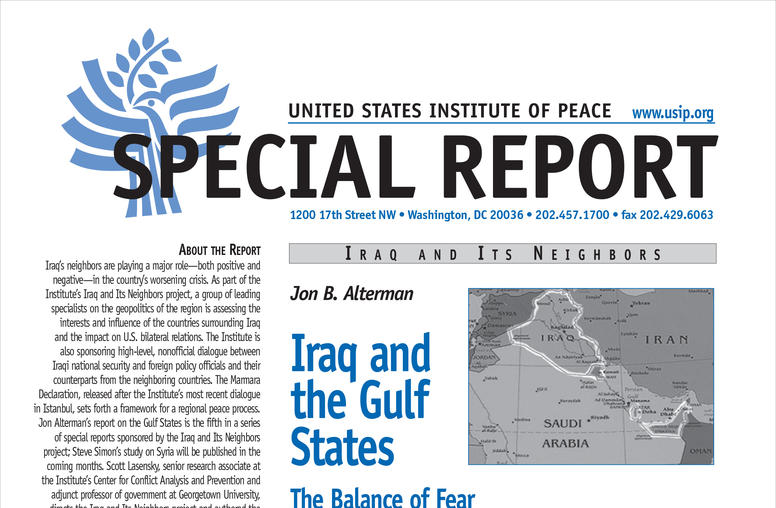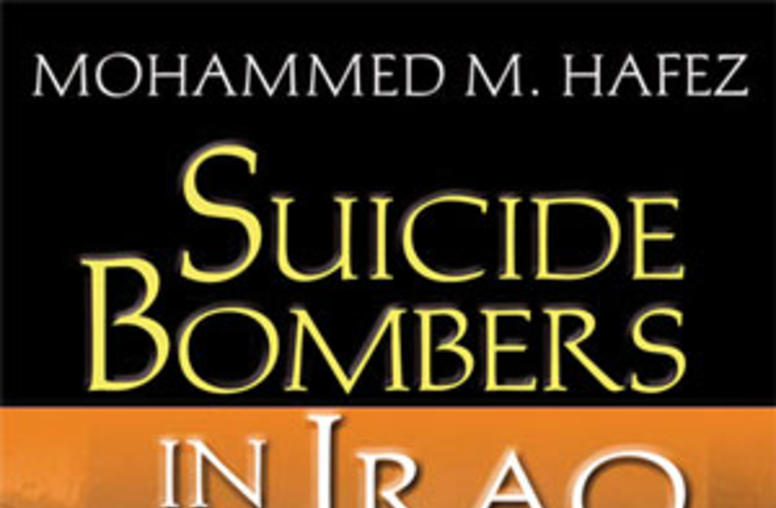Publications
Articles, publications, books, tools and multimedia features from the U.S. Institute of Peace provide the latest news, analysis, research findings, practitioner guides and reports, all related to the conflict zones and issues that are at the center of the Institute’s work to prevent and reduce violent conflict.

Iraq and the Gulf States: The Balance of Fear
Iraq’s Persian Gulf neighbors supported the U.S. invasion of Iraq in order to preserve the status quo--a weak and self-absorbed Iraq--rather than to impose a new one. However, the overthrow of Saddam Hussein and its aftermath have not brought stability to the Gulf States as much as they have shifted the most serious challenges from external threats (of a hostile Baghdad) to internal threats (the threat of conflict spillover from Iraq).

Unity in Diversity
Nowhere are the stakes of sectarian conflict as high as in the Middle East, and nowhere is the practice of interfaith dialogue (IFD) more fraught with difficulty. The questions, then, naturally arise: What sort of person tries something as audacious as interfaith dialogue in such a polarized climate? And what do they hope to gain? The answers to both questions are surprisingly diverse.
Public Health and Conflict in Iraq
On March 22, 2007, the U.S. Institute of Peace (USIP) and Johns Hopkins Bloomberg School of Public Health (JHSPH) Task Force on Public Health and Conflict held its third symposium, Iraq: Rebuilding a Nation’s Health. The Task Force is committed to raising the profile of conflict analysis and resolution in the field of public health education.
Journey of Death: Suicide Bombers in Iraq
Over the past four years, suicide bombings have become a choice weapon of the insurgency in Iraq. Today, terrorists and insurgents perpetrate suicide attacks regularly, taking a profound physical and psychological toll on the local population and the multinational forces serving in the country.

Suicide Bombers in Iraq
Author Mohammed Hafez examines the history of suicide bombing in Iraq, theoretical perspectives on suicide bombing, the varied factions that comprise the insurgency and the ideology and theology of martyrdom supporting suicide bombers in his new book Suicide Bombers in Iraq.
Suicide Bombers in Iraq
USIP grantee Mohammed Hafez briefed staff on the House Foreign Affairs Committee and the Senate Foreign Relations Committee on his recently USIP-published book Suicide Bombers in Iraq: The Strategy and Ideology of Martyrdom. Hafez is a visiting professor at the University of Missouri, Kansas City.
Healing and Reintegrating the Victims of Congo’s War
Child soldiers and women are among the most vulnerable victims of Congo’s war. Attending to their needs for reintegration, counseling, and medical attention are critical components for consolidating peace.
Rebuilding Civil Society in Afghanistan: Fragile Progress and Formidable Obstacles
Nearly six years after the U.S.-led invasion of Afghanistan, efforts to develop civil society are showing tentative signs of progress. The effectiveness of civil society in influencing development in the provinces remains low, and rising insecurity in many regions threatens the future prospects of the nascent Afghan civil society.
Developing and Managing Congo’s Natural Resources
The Democratic Republic of Congo (DRC) is among the most mineral-rich countries in Africa. During the war, those natural resources fueled the conflict, and provided illegal sources of wealth for some. Now, as the DRC undertakes the rebuilding of its economy, the management of natural resources serves as a key component in its development strategy.
No Silver Bullets for Afghanistan’s Drug Crisis
Afghanistan supplies more than 90 percent of the world’s opium. Despite concerted efforts to tackle the drug problem in Afghanistan, the industry continues to grow at an alarming rate, particularly in the south, where reconstruction efforts lag amidst poor security.